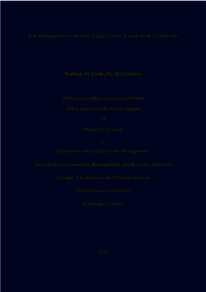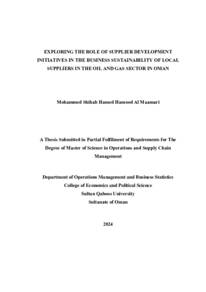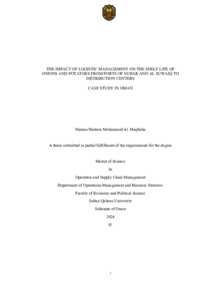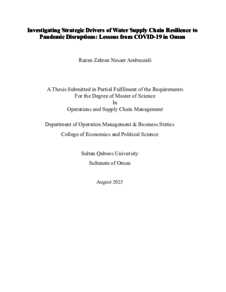Document
Risk management in aviation supply chain : a case study of Oman Air.
Source
Master's thesis
Country
Oman
City
Muscat
Publisher
Sultan Qaboos University
Gregorian
2023
Language
English
Subject (Name)
Thesis Type
Master's thesis
English abstract
The aviation industry holds a pivotal position in driving economic growth, fostering national
pride, and facilitating easy mobility both domestically and internationally. However, this sector
encounters numerous risks and challenges that necessitate meticulous control and management
to ensure uninterrupted business operations. The inherent sensitivity of the airline industry underscores the need for constant and adept risk management. This research focuses on the risk
management in aviation supply chain at Oman Air.
Oman Air is the flagship carrier of the Sultanate of Oman, and like many other airlines, faces
a litany of diverse and varied risks. A review of available literature reveals a range of risks
facing airline firms across the world, and the risk mitigation strategies employed by these firms.
The drawback of this literature is that it mostly reviews airlines in developed countries like
North America, Europe, Japan, Australia, China and Turkey. There are significant differences
between airlines operating in those markets as compared to Oman and other countries in the
Gulf region, which have been largely neglected. This research targets this gap in the literature
with three principal aims which are to identify the key supply chain risks faced by Oman Air,
to identify risk mitigation techniques and management strategies and to identify and recommend deficiencies in those techniques and strategies.
The methodology used in this research is the case study methodology. Using a mixed methods
approach, the study collected survey responses from 106 employees of the firm and conducted
interviews with two senior employees of the supply chain department at Oman air. In addition,
the researcher used a quantitative method in analyzing the data and testing the Cronbach's alpha
reliability by using SPSS software. The findings and recommendations of the study are detailed
therein.
Oman Air's supply chain is susceptible to various internal risks, such as operational challenges,
IT vulnerabilities, financial uncertainties, and service delivery fluctuations.
Externally, the supply chain is exposed to political upheavals, natural disasters, labor issues,
health and safety concerns, environmental factors, investment uncertainties, transport and logistics challenges, fuel supply uncertainties, and market fluctuations. Risk identification, assessment, mitigation and control are all aspects of Supply Chain Risk Management (SCRM).
To effectively address risks, Oman Air must identify potential risks, collaborate with stakeholders, assess them, and decide on a plan of action. They should document each risk, including its type and preventative actions in a risk register. Subsequently, they should regularly examine each risk to determine its category and associated mitigation plan. Furthermore, reporting on
risks, along with best practices, and techniques, can be instrumental in enhancing the overall
effectiveness of Oman Air's risk mitigation plan. Additionally, routine reporting will not only
reveal potential additional risks but will also contribute to improved decision-making.
Category
Theses and Dissertations




